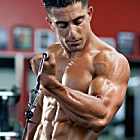 All bodybuilders get a lot of the same questions often, even from other bodybuilders. “Normal” people will ask each other things like, “How’s work?” or, “How’s the family?” A similar just-making-conversation question we say and hear all the time is, “How’s your training going?”
All bodybuilders get a lot of the same questions often, even from other bodybuilders. “Normal” people will ask each other things like, “How’s work?” or, “How’s the family?” A similar just-making-conversation question we say and hear all the time is, “How’s your training going?”
I’m usually a lot more enthused about answering that question in the off-season. That’s what really makes or breaks a bodybuilder because it’s the time that you can train heavier, eat a lot more food, do little or in many cases no cardio, and grow. It’s when you bring up lagging bodyparts and add overall mass, if you need to—and most of us do still need to. So, understandably, I’m a lot more excited about my workouts in the off-season.
In contrast, once you start dieting for a contest (or for whatever reason you have for wanting to get ripped), a process that I give myself 16 weeks for and most competitors average 12 to 16 weeks, your weight-training workouts take on a different function: maintenance. You’re not training to gain anymore, just to maintain your mass while you get rid of as much bodyfat as is humanly possible—then get rid of a little more.
A lot of you just bristled in your seat at the very thought that you should ever pick up a weight if not to gain muscle. Blasphemy! Negativity! Defeatist! No, realist.
Recently, I put the question to legendary trainer Charles Glass, and he stated that in all his years of training bodybuilders, he’d never seen one make significant gains while on a contest diet. Keep in mind that Glass has worked with some of the most genetically gifted men and women on the planet over the past 30 years, many of whom were enhanced with substances that would normally promote muscle growth. The reason is that the raw materials just aren’t there. Just as you can’t build an addition to your home without lumber, cement and plaster, you can’t synthesize new muscle tissue without a surplus of calories. If you’re in a caloric surplus and growing, you won’t be dropping much bodyfat.
So when we prepare for contests, it’s our diet and cardio that are really the main stars, with the weight training taking on a supporting role. You still want to train as hard as you can and keep the weights as heavy as possible. Thanks to the videos of Ronnie Coleman hefting ridiculous weights like 800-pound squats and deadlifts just weeks away from winning the Mr. Olympia, many have the mistaken impression that you should be just as strong as ever regardless of whether you’re eating 5,000 calories in the off-season or 2,000 in the final stages of a diet. Believe me when I say that Ronnie is definitely a rare exception in that regard, not to mention that he was always incredibly strong. Strength will go down a bit as the weeks go by and you get leaner, and that’s perfectly fine. Just as a very rough example, maybe you normally press 120s for eight reps in your heaviest set on the incline dumbbell press—at an off-season bodyweight of 220 pounds.
If your contest weight before dropping water is going to be right around 200 pounds, it will be truly amazing if you are still putting up those same 120s for eight reps a couple of weeks before your contest. More likely, you’ll be using 100s or 110s. Some guys freak out about their strength levels diminishing, but a drop like that is nothing to be concerned about. If you found yourself struggling with 80s, that would be a sign that you probably lost too much muscle.
Losing muscle on a diet can happen for various reasons. One is getting too fat in the off-season and attempting to lose too much fat too soon. Another is not eating enough, and yet another is doing too much cardio. How do you know how much to eat and how much cardio to do? If you’re working with a coach, it’s his or her job to figure that out and tell you. If you’re on your own, you need to keep track of your nutrition and your cardio and cross-reference them with your body composition—then either stay the course or adjust one or both, as needed.
The final reason that many competitors lose muscle mass leading up to a contest—and, again, I’ve said this before—is overtraining. This is not the time to add a bunch of exercises and start doing supersets, giant sets and drop sets. Sure, you look great all pumped up now that you’re leaner, but you must always remember that you’re not getting as many calories as you were a few months ago. This is the time to be more conservative with your training volume and intensity, not ramp it up.
If you play your cards right and listen to your body, you will keep all your muscle mass and look fantastic. If you insist on assaulting your body with very heavy weights and extra volume and intensity as you lean out, you will either get injured, lose muscle or both. —Ron Harris
Editor’s note: Ron Harris is the author of Real Bodybuilding—Muscle Truth From 25 Years in the Trenches, available at www.RonHarrisMuscle.com.




















You must be logged in to post a comment Login